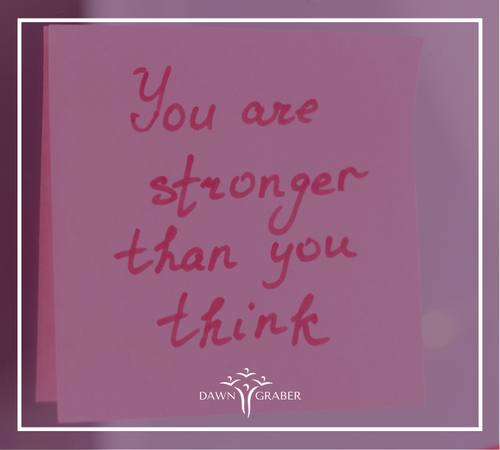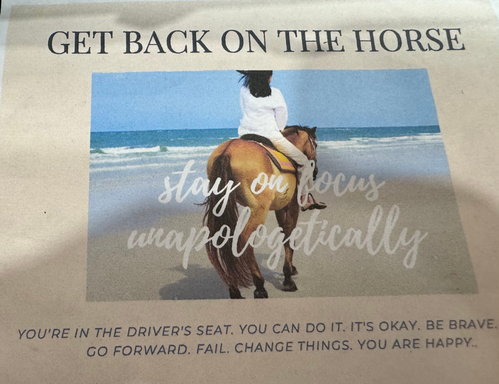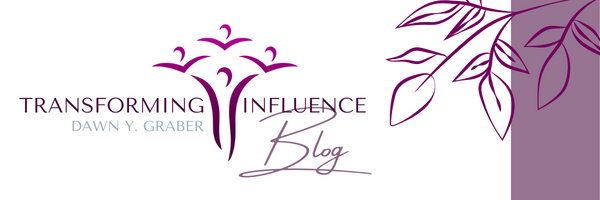The Power of Self-Affirmation
Part 2
Pumping Up from the Pool Deck
“Let’s say HEL-LO to ourselves!!!” (the instructor punches her fist in the air while making hello into a pronounced two-syllable word both loudly and joyously)
“Let’s say HEL-LO to our friends!!! (the instructor points to members in the pool, cajoling us to look each other in the eye and wish them a heartfelt hello).
“Let’s wish each other a HEALTHY! (pause for effect) HAPPY! (pause for effect) SATURDAY!!! (The instructor’s voice reaches a crescendo, doing all she can to bring her students into the world with a positive mindset.)
I witnessed the power of the aquacise instructor’s belief system and actions as she riled up 30 adults into what resembled a pre-game huddle frenzy. But it’s when we’re about to leave the pool. She goes through this 3 part routine every Saturday after we’ve gotten our heart rate up, used our muscles, and calmly stretched to quieter music. After all that, Carolyn jazzes up the crowded pool members again. Why? She wants us to be healthy. She wants us to be happy. She believes that hearing ourselves declare that such is also our desire is one more important step to our health and happiness. I always feel like a little kid, like cheering at a middle school football game when I participate in her parting blessing, but I love it. I feel the wonder of positive self-affirmations.

Defining Affirmation
Affirmations are defined as
“...any act that underscores one’s adequacy and reaffirms one’s sense of self-integrity.” (Bredhoft, D.).

Positive affirmations, referring to the author's statements said or viewed multiple times daily, have been studied seriously since the 1980’s. The field of neuroscience has blossomed and helped us understand corresponding brain activity when we receive positive, neutral, or negative self-affirmations. The Social Cognitive and Affective Neuroscience publication of the National Library of Medicine (NLM) released a study by Cascio et al. highlighting the positive effect of specific neural processes activated through self-affirmation made even stronger with the promise of additional future imagination. Looking forward while practicing self-affirmation, using our imaginations, and repeating the process has the promise of positive returns.
The Benefits of Positive Affirmations
1. “...a class of interventions called self-affirmations have benefits across threatening situations; Self-affirmations have been found to decrease stress, increase wellbeing, improve academic performances and make people more open to behavior change.” (Cascio et al.)
2. The aspects of the brain stimulated by positive affirmations allow one to live out of the sage part of the brain where empathy, curiosity, exploration, adaptability, deep focus, compassion, gratitude, calmness, and gratitude can more easily be accessed. (Positive Intelligence)
3. Positive self-affirmations build self-control and self-efficacy (believing in one’s capacity to act in such a way to reach one’s goals) as one keeps what’s really important to oneself front and center. This has been shown numerous times to help empower the attainment of health goals.
4. Time spent writing and reading one’s identified core values has been measured to increase prosocial behaviors, including a higher level of happiness. Celebrating how the glass is more than half full affects our attitudes positively, much like implementing a regular gratitude journal.
5. The effects of self-affirmation have been found to be helpful in situations of inner conflict where bias is present.
6. Improved academic achievement occurs when students record their strengths in writing and speak declarative and positive expectations of what they will achieve before a test or presentation.
7. Increased objectivity to be open to continued learning and growth in multi-dimensional opportunities has been discovered to be true when people engage in self-affirmation. (Bredehoft, D.)

Following our Sage Instead of our Saboteurs
An important aspect of my self-talk benefits from the mental fitness exercises offered by Shirzad Chamaine and the Positive Intelligence program. Shirzad does a lot of work with the brain research of imagination and self-talk. The PQ® program identifies that the lion in the bush is most commonly our saboteur that too frequently fires first in our brain, attempting to protect us from harm but instead keeps us from our greatest successes. Shirzad is famous for referring to our tendency to operate from and stay under the restraint of negative emotions, similar to holding our hands on the hot stove. We can achieve when our saboteurs direct our actions/beliefs, but we will hurt ourselves, our relationships, and our productivity in the long run. Achieving through our saboteurs will look like operating full of judgment, fear, anxiety, control, victimhood, perfectionism, restlessness, pleasing everyone, hyper-achieving, avoiding, and being hyper-rational. How much better to notice when negative emotions arise (the hand on the hot stove) and instead switch to a sage mindset? The PQ® program helps us shift the negative self-talk led by fear and saboteurs housed in the emotional response part of the brain and instead allows us to engage the sage aspect of our brain more quickly to direct our steps.

When positive self-talk based on identity belief fires together- new neural circuitry is developed that allows for creative and laser-focused exploratory goal setting while building a natural repellant when defenses are needed. One of the recent challenges of the PQ® programs (daily app strengthening exercises like in Mygrow) was to imagine it was my last day. But it wasn’t a somber activity. It wasn't an exercise to consider which activities and with whom I would share my final day with. Instead, Shirzad had an incredible challenge: IF this was my last day and I couldn’t change any activities of my day or who I would be with or not be with- how would my showing up in each of these 24 hours be different? I love this exercise to keep my values and my “I am” belief systems front and center for both myself and the good of others during the day. Experiencing a practice “last day” pushes one to wear the lens of a positive belief system, desiring impactful influence to be shared and gratitude overflowing for the preciousness of each flower, tree, grocery store clerk, impatient driver, or demanding loved one.
Some Pointers to get started with Self-Affirmations
↪ Schedule some time to re-identify your core values. What is important to you? Make affirmations about what you love and your highest values in expressing your best self.
↪ One idea discovered in building the power of self-affirmation from the NLM published study was writing extensively about your number one value and how you live it out. Build those neural pathways by concentrating for a length of time on the highest and truest ways you show up in the world.
↪ Believe what you’re saying about yourself at least 50%, according to Natalie Dattilo, a clinical psychologist from Brigham and Women’s Hospital in Boston. General affirmations are not as impactful (Chiu, A.)
↪ If you can’t yet ‘love’ what and who you are, try beginning with the statement, “I want to believe I am __________,” and begin envisioning situations and your situations as resolving successfully and being influenced because of your value.
↪ Practice reading, writing, and stating your self-affirmation statements before times of responsibility, such as client meetings, presentations, crucial conversations, and negotiations. You will subsequently experience lower cortisol responses to the moment's stress and be able to think more clearly and positively.
↪ Know that building effective and impactful positive self-identities through the practice of self-affirmations will take work and time. We are wired to fear the lion to ensure our survival. We have had years of building negative self-perceptions that are now highways of quick and easy access through our previously laid down neural pathways. The good news is we can turn those pathways into less traveled rural roads and instead put down the foundations for building new, larger, beautiful highways of expansive, positive mindsets. Truly, the outcomes of practicing positivity and living out of our sage brain will make greater transformational impacts on our relationships and work outcomes. But it’s a daily practice with perhaps new habits of positive self-affirmations that take commitment.
↪ Thinking, seeing with our eyes, and speaking our truth is a wonderful way to build out our success in 2024. Seeing our behaviors courageously following our words will most quickly build a healthy self-perception where we can bloom into our full transforming influence for the betterment of ourselves and our organizations.

Many of you have chosen a word for the year. Try taking ‘your word’ and making it into a positive affirmation. Don’t state what you’ll do (even though envisioning your success is vital), and don’t describe what processes you’ll put in place to make it happen (as important as strategy and process are). Instead, what is your ‘word of 2024’ and how can you write a positive affirmation using that word to describe who you are? I’ll get us started! 🙂
I am ‘successful’ with offerings that equip and empower women to use their full transforming influence in a gender-biased world.
How are you going to talk positively to yourself in 2024?
Transforming influence alongside you,

What I'm Reading:
Social Cognitive and Affective Neuroscience by Christopher N. Cascio and others (Volume 11, Issue 4, April 2016, Pages 621–629). Self-affirmation activates brain systems associated with self-related processing and reward and is reinforced by future orientation.
The Science Behind Self-Affirmations: Science shows that self-affirmations are valuable for health and well-being by Bredefhoft, D. (Psychology Today).
How to make self-affirmation work, based on science by Chiu, A. (The Washington Post).
Positive Intelligence. Check out Shirzad’s anchor text of the same name and numerous white papers on the website providing research on the importance and potential of shifting our mindset to live more out of our sage brain than our saboteur-led negative emotions. I am a PQ® coach and would love to guide your team through the six-week Positive Intelligence mental fitness program to ensure your team members' well-being and your organization's flourishing. Ask me more!

February 22, 2024

Comments